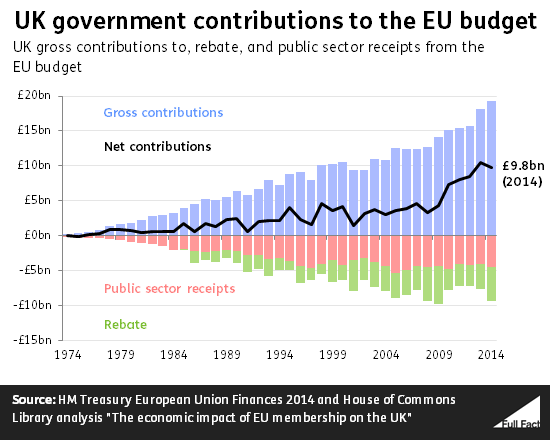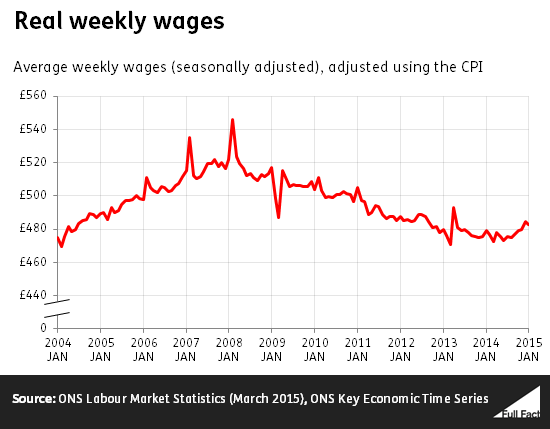Key claims from the UKIP manifesto launch
UKIP pitched up in Thurrock today, where Nigel Farage and Suzanne Evans delivered speeches launching the party's general election manifesto. We've looked at some of the headline claims on Europe, immigration, health tourism and foreign aid spending. The claims are taken from speeches by Nigel Farage and Suzanne Evans at the launch of the UKIP manifesto.
The European Union and immigration
"Save £9 billion a year in direct net contributions to the European Union budget by leaving the EU"—manifesto, page 8
"We have nothing to lose and everything to gain from Brexit, not least the ability to bank £9 billion a year that we will recoup from direct contributions"—Evans' speech
- The UK government's net contribution to the EU was around £10 billion in 2013/14. This includes payments to the EU budget of £18 billion, and receipts (including the rebate) to the UK public sector from the EU of about £8 billion.
- On a calendar year basis, the net contribution by the UK government to the EU budget in 2014 was £9.8 billion. That's £27 million a day.
"We cannot prevent the flow of citizens from all EU member states into Britain...the other parties have failed to control immigration"—manifesto, page 12
"The great truth about this immigration debate is that only by leaving the EU can we control imigration into this country"—Farage's speech
- The government can't restrict the movement of EU citizens using immigration policy.
- The Conservative party set a target to reduce net migration from the 'hundreds of thousands' to the 'tens of thousands' before the election. It has been seen as a government objective, although it wasn't in the Coalition Agreement.
- The target has generally been taken to mean that the upper limit on the net migration would be set at around 100,000.
- This hasn't been achieved. Net migration into the UK stood at 298,000 in the 12 months ending in September 2014, around 3 times higher than the target.
"Apply a moratorium to unskilled and low-skilled labour over the course of the next parliament"—UKIP manifesto, page 12
"We must end... the downward pressure on wages... and unemployment to fall, and I mean a genuine fall. A five-year moratorium on immigration for unskilled workers will cut it by 150,000 and will get young British workers back into work"—Evans' speech
- Real wages (which take rising prices into account) are slightly lower they were at the start of 2005.
- But 'real wages' aren't what people take home—taxes and benefits play their part, and the level of employment matters as well. Household disposable income per head, adjusted for changing prices, is slightly higher now than it was in 2010.
- Research suggests that immigration has a small impact on average wages of existing UK workers but more significant effects for certain groups.
- Low-wage workers lose out while medium and high-paid workers gain.
- The evidence doesn't show a significant impact of overall immigration on unemployment in the UK, but suggests that immigration from outside the EU could have a negative impact on the employment of UK-born workers, especially during an economic downturn.
- For both wages and employment, short run effects of immigration differ from long run effects: any declines in the wages and employment of UK-born workers in the short run can be offset by rising wages and employment in the long run.
"This country needs to build one house every seven minutes just to cope with current immigration levels into Britain"—Farage's speech
"To meet demand, we must build one home every seven minutes"—manifesto, page 11
- One house built every seven minutes means about 75,000 houses a year.
- Is this what we need to house immigrants? Possibly, but there are many things about this that are uncertain.
- We wouldn't expect every immigrant to need a house each; some will live together. Best estimates suggest about 300,000 more immigrants come in than emigrants go out each year.
- If 75,000 homes is the 'need' then you're assuming four immigrants to a house. It also depends on other important assumptions, such as about how long immigrants stay for. We've been looking and we're still looking but we haven't yet seen any evidence to support such an exact figure.
- Immigration is also notoriously difficult to measure, and predicting how this will look in future years is even harder.
- The official projected need is for 220,000 new households per year, taking immigration into account.
Health tourism
"We need to get tough on so-called 'health-tourism.' Every year the NHS spends up to £2 billion of UK taxpayers' money treating those ineligible for free care"—manifesto, page 16
"[...] I made the comment that health tourism was costing up to about £1.8 billion a year and that £1 billion of that was actually very recoverable"—Farage's speech
- 'Deliberate' use of the NHS—use by those who come here specifically to receive free treatment or who come for other reasons but take advantage of the system when they're here—is hard to quantify. It's thought to be very roughly between £110 million and £280 million a year.
- 'Normal' use of the NHS—by foreign visitors who've ended up being treated while in England—is estimated to cost about £1.8 billion a year.
- The majority of these costs aren't currently charged for. Only about £500 million is thought to be recoverable or chargeable at the moment.
"Anybody can fly into Britain regardless of whether they've ever been here before, of whether they have any connection with this country, go to a London hospital, have a test for HIV, and if they're proved positive, then receive retroviral drugs that are worth more than £20,000 a year" —Farage's speech
- We don't have data on the nationality of those diagnosed with HIV. Figures are based on the country of birth of patients, which is not the same.
- They show that of the 6,000 people diagnosed in 2013, 2,300 (38%) were born in the UK; 2,700 (45%) were born in the rest of the world; and the birthplaces of 1,000 (17%) were not reported.
- Of those whose birthplace was reported, 54% were born outside the UK. That's the nearest that the figures seem to show to the claim, but it masks the uncertainty of the 17% whose birthplace is not reported.
Foreign aid spending
"USA aid currently stands at 0.2 per cent of GNI and this is what we will match. This change will be phased in over three years and the UK level of overseas aid will remain substantial, not falling below £4 billion per annum"—manifesto, page 69
"We will reduce the overseas aid budget to 0.2% of GNI, that's the same as the United States. This still leaves us a substantial £4 billion to meet our international responsibilities"—Evans' speech
- Last year, the UK gave almost £12 billion in 'Official Development Assistance'.
- This is based on a target promoted by the UN: devoting 0.7% of gross national income (GNI) to foreign aid.
- If we were to instead aim to spend 0.2% of GNI, as UKIP recommend, that would have been around £3.5 billion in 2014. That's a saving of around £8 billion.
- Around £800 million of this figure was through the European Union, and came out of the EU budget, which we are currently obliged to contribute to.

